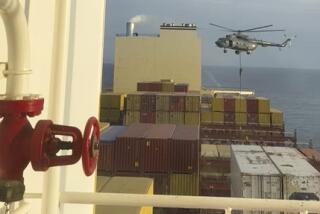Persian Gulf War: Iran and Iraq Deadlocked After 6-Year Battle
- Share via
Iran and Iraq, long at odds over control of the Shatt al Arab waterway formed by the Tigris and Euphrates rivers, have been fighting since Sept. 17, 1980, when Iraq abrogated a 1975 accord dividing the waterway and invaded Iran’s Khuzistan province. Iraq expected a quick victory over a foe still in turmoil after the 1979 revolution that overthrew Shah Mohammed Reza Pahlavi, but Iran soon regained territory lost in the invasion.
Since then, despite an estimated half a million casualties, the ground battle has been largely a stalemate. In recent months, both nations have stepped up air attacks on shipping in the Persian Gulf, through which much of the world’s oil passes, in an attempt to bring economic ruin to the other. Iraq hopes to destroy Iran’s oil export business, while Iran seeks to dry up the financing for Iraq’s war effort by threatening its Arab allies--Saudi Arabia, Kuwait, Jordan and Egypt, which fear Iran’s drive to spread Islamic fundamentalism.
There have been reports of a buildup for a climactic land battle. Iran has reportedly massed 650,000 troops, mostly poorly trained volunteers, along a 600-mile front defended by a much better equipped force of 300,000 Iraqis in fixed positions
Iraq warplanes have repeatedly raided the big Iranian oil terminal at Kharg Island. When Iran started using oil terminals farther down the gulf from Iraq, the Iraqis were able to hit the facilities by using recently acquired French Mirage F1-E fighter-bombers that were refueled in the air by Soviet-supplied tanker planes. Iraq now is also believed to be using laser-guided “smart bombs.”
Iran’s air force, including F-4s and F-14s purchased from the United States by the shah, has been handicapped by lack of spare parts because of a U.S. embargo on arms sales. But it has been able to buy massive quantities of arms from other countries, according to the International Institute for Strategic Studies in London. It has used its jet fighters and helicopter gunships to attack shipping in the gulf. It frequently stops and searches cargo vessels it suspects of carrying war material to Iraq.
Mediation efforts by the United Nations, the Organization of the Islamic Conference, the Nonaligned Movement and individual nations have failed. Iran’s revolutionary Islamic government has rejected Iraqi peace overtures, demanding $150 billion in reparations and the ouster of Iraqi President Saddam Hussein’s Government.
More to Read
Sign up for Essential California
The most important California stories and recommendations in your inbox every morning.
You may occasionally receive promotional content from the Los Angeles Times.













